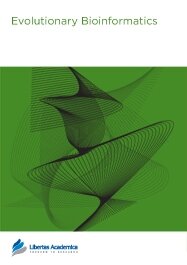

Publication Date: 06 Aug 2012
Type: Original Research
Journal: Evolutionary Bioinformatics
Citation: Evolutionary Bioinformatics 2012:8 463-473
doi: 10.4137/EBO.S9656

We have analysed the efficiency of all mitochondrial protein coding genes and six nuclear markers (Adora3, Adrb2, Bdnf, Irbp, Rag2 and Vwf) in reconstructing and statistically supporting known amniote groups (murines, rodents, primates, eutherians, metatherians, therians). The efficiencies of maximum likelihood, Bayesian inference, maximum parsimony, neighbor-joining and UPGMA were also evaluated, by assessing the number of correct and incorrect recovered groupings. In addition, we have compared support values using the conservative bootstrap test and the Bayesian posterior probabilities. First, no correlation was observed between gene size and marker efficiency in recovering or supporting correct nodes. As expected, tree-building methods performed similarly, even UPGMA that, in some cases, outperformed other most extensively used methods. Bayesian posterior probabilities tend to show much higher support values than the conservative bootstrap test, for correct and incorrect nodes. Our results also suggest that nuclear markers do not necessarily show a better performance than mitochondrial genes. The so-called dependency among mitochondrial markers was not observed comparing genome performances. Finally, the amniote groups with lowest recovery rates were therians and rodents, despite the morphological support for their monophyletic status. We suggest that, regardless of the tree-building method, a few carefully selected genes are able to unfold a detailed and robust scenario of phylogenetic hypotheses, particularly if taxon sampling is increased.
PDF (590.86 KB PDF FORMAT)
RIS citation (ENDNOTE, REFERENCE MANAGER, PROCITE, REFWORKS)
Supplementary Files 1 (15.11 KB ZIP FORMAT)
BibTex citation (BIBDESK, LATEX)
XML
PMC HTML
This is the fastest progress we have experienced from submission to acceptance. Reviews are fast, pertinent, and instructive. Every step of the process is visible and prompt, and every email is friendly and immediate. In all, it is an excellent experience to be published in Libertas Academica.

All authors are surveyed after their articles are published. Authors are asked to rate their experience in a variety of areas, and their responses help us to monitor our performance. Presented here are their responses in some key areas. No 'poor' or 'very poor' responses were received; these are represented in the 'other' category.See Our Results
Copyright © 2013 Libertas Academica Ltd (except open access articles and accompanying metadata and supplementary files.)
Facebook Google+ Twitter
Pinterest Tumblr YouTube